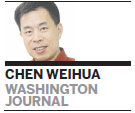
The meeting on Nov 7 between leaders from two sides of the Taiwan Straits has been regarded as not only significant to the cross-Straits relations but also to China-US relations.
It was the first such meeting between leaders on the Chinese mainland and Taiwan. The courage and flexibility displayed by the handshake and meeting is encouraging, reminding many of other historic moves made in past decades.

In April, 1993, Wang Daohan, president of the Chinese mainland-based Association for Relations across the Taiwan Straits and Koo Chen-fu, chairman of Taiwan's Straits Exchange Foundation, also met in Singapore to push for exchanges and cooperation. They reached the so-called "1992 Consensus", which basically says that there is only one China.
Then in April 2005, then Kuomintang (KMT) Chairman Lien Chan made a historic trip to the Chinese mainland to meet Hu Jintao, then general secretary of the Communist Party of China. The ice-breaking trip took place amid disturbing behavior by then Taiwan leader Chen Shui-bian.
The cross-Straits relationship has enjoyed the greatest peace and prosperity in the last seven years since Ma Ying-jeou became the leader of Taiwan. The numbers cited by Ma in the Nov 7 speech reflected that achievement: the annual 8 million trips by people across the Straits, and the $170 billion trade volume.
In fact, the Chinese mainland put the 2014 trade figure at $198.3 billion, which literally means that cross-Straits trade is larger than the Chinese mainland's trade with Germany or Australia.
The 3.64 million Chinese mainland tourists to Taiwan in 2014 was the largest, followed by 1.48 million from Japan and 1.24 million from Hong Kong and Macao.
While hundreds of flights shuttle between the two sides of the Taiwan Straits every week, the first chartered flight between the Chinese mainland and Taiwan was only made possible in 2003 and it had to go via Hong Kong.
The Nov 7 meeting is truly significant, yet no one should assume that the differences between the two sides of the Taiwan Straits will be solved at one meeting or quickly. In fact, no one should have such unrealistic expectations for any relationship.
However, as with the previous landmarks, closer cross-Straits relations in the past decades have greatly reduced the possibility of military confrontations.
The United States, which suffered from unstable cross-Straits relations like those under Chen Shui-bian, applauded the Nov 7 meeting.
"The United States welcomes the meeting between leaders on both sides of the Taiwan Straits and the historic improvement in cross-Straits relations in recent years," said State Department spokesman John Kirby in a statement on Saturday.
"The United States has a deep and abiding interest in peace and stability in the Taiwan Straits, and we encourage further progress by both sides toward building ties, reducing tensions, and promoting stability on the basis of dignity and respect," he said.
The Taiwan issue has long been a source of tensions in China-US relations, especially when the US sells arms to Taiwan.
"It was a good meeting and probably served the purposes of both sides in terms of trying to consolidate the basis of current cross-Straits relations as well as, especially for Ma, laying out important issues of concern for the people of Taiwan," Alan Romberg, a distinguished fellow and director of the East Asia Program at The Stimson Center in Washington, told China Daily on Sunday.
Romberg said, however, that it was still far from clear what the long-term impact will be if the next administration in Taiwan does not directly endorse the 1992 Consensus or some other form of "one China," and if Beijing continues to insist that such an endorsement is essential for continuation of smooth relations.
"The DPP (Democratic Progressive Party) position appears to be to adopt policies 'not inconsistent' with the 1992 Consensus, but not to endorse that consensus directly," said Romberg, speaking on the assumption that DPP leader Tsai Ing-wen wins the January election in Taiwan.
While Tsai voiced her disappointment at the Saturday meeting, what is clear is that the meeting has injected fresh momentum in setting cross-Straits relations on the right track.
Just as Chinese mainland leader Xi Jinping said on Saturday that Chinese people on both sides of the Taiwan Straits have the ability and wisdom to solve their own problems.
"No force can pull us apart because we are brothers who are still connected by our flesh even if our bones are broken, we are a family in which blood is thicker than water," Xi said.
The leaders on both sides of the Taiwan Straits have indeed displayed their wisdom and more is expected in the coming months, years and decades.
Contact the writer at chenweihua@chinadailyusa.com